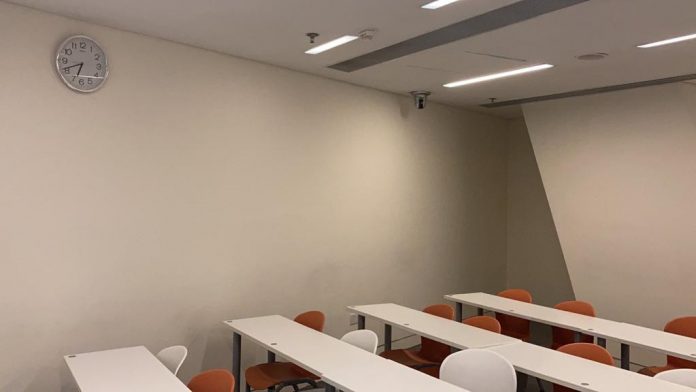Hong Kong universities have begun filming classes, as ‘national security education’ is rolled out in several of the city’s higher education institutions, forcing young people to absorb government propaganda about an ongoing crackdown on public dissent and peaceful protest.
Reuters reported on Nov. 5 that at least one surveillance camera was visible in a lecture hall at Hong Kong Baptist University, citing two students who attended a compulsory “national security education” class similar to those being rolled out in all the city’s universities, while an unidentified person was taking photos.
Compulsory national security education is currently being rolled out at the Baptist University, the Polytechnic University (PolyU), Lingnan University, and the Education University. While it seeks to inform students exactly which sorts of behaviors could constitute a breach of the law, there is also a heavy emphasis on patriotism and bolstering a sense of Chinese identity among Hong Kong residents, according to course materials seen by Reuters.
Former PolyU social science lecturer Chung Kim-wah said he would usually warn students before photographs were taken of them, allowing those who don’t want to be photographed to remove themselves temporarily.
He said he had also read the course materials seen by Reuters.
“Basically, they’re just a mouthpiece for the government,” Chung said, adding that, according to his information, all PolyU classes and lectures must now be filmed in their entirety.
“As far as I know, every PolyU class, including the social science faculty, is being filmed now,” Chung said. “A former colleague of mine told me very directly that it is basically impossible to speak freely now, especially when teaching social sciences.”
“It has already had a deterrent effect on some [former] colleagues,” he said. “I asked them why nobody had spoken out about this, and they said everyone’s afraid.”
Fiona Cheung, vice president of foreign affairs of the PolyU Student Union, said video recording of classes started during the hybrid teaching system adopted due to the coronavirus pandemic, but that the cameras weren’t only used to record online classes.
“We have seen newly installed cameras,” Cheung told RFA. “Before, there was only a camera in front of the teacher’s computer, but now there’s also a camera in the middle of the seating area that films everyone present in the class.”
“So everything that happens in a class will be filmed, which is having a bad effect on students,” she said.
A request for comment from PolyU went unanswered at the time of writing on Monday.
Banned words, actions
“National security education” — which is being tailored to all age-groups from kindergarten to university — is mandated under a draconian national security law imposed on Hong Kong by the CCP from July 1, 2020, the government says.
The law bans words and deeds deemed subversive or secessionist, or any activities linked to overseas groups as “collusion with foreign powers,” as well as public criticism of the Hong Kong government or the CCP.
It has ushered in an ongoing and citywide crackdown on all forms of public dissent and political opposition, with dozens of opposition activists charged with “subversion” for taking part in a democratic primary, and election rules changed to ensure only pro-CCP candidates can run.
The government is also pushing ahead with further legislation on espionage and other “covert” activities to continue a crackdown on what Beijing insists was an attempt by hostile foreign powers to foment a “color revolution” in Hong Kong during the 2019 protest movement.
Several civil society organizations, including the group that ran the now-banned Tiananmen massacre vigils, protest march organizers the Civil Human Rights Front, the Professional Teachers’ Union, and Wall-fare, a prison support group for those in custody because of the 2019 protest movement, have disbanded after being denounced by Hong Kong’s leaders or CCP-backed media.
‘Statutory obligation’
A spokeswoman for Hong Kong’s Education Bureau said it is a “statutory obligation” to promote national security education in universities, Reuters reported.
“The community would expect the universities to uphold good governance and accountability to the public, and their operations have to comply with the law and meet the interests of students and the community at large,” she said in comments emailed to the news agency.
Reuters said at least six liberal academics have been forced from their university jobs, while student unions have been disbanded and student leaders arrested.
Universities will be required to raise the Chinese national flag in daily ceremonies starting in January, according to a recent directive from the Education Bureau.
Meanwhile, China’s ministry of education is pushing ahead with plans to make it easier for Hong Kong students to enroll in universities in mainland China on the basis of their secondary school diploma, waiving the need to sit an entrance exam.
From 2022, 129 higher education institutions will accept direct applications from Hong Kong residents across 21 provinces and municipalities, the Hong Kong education bureau said in a Nov. 4 statement on its website.
Translated and edited by Luisetta Mudie.
Add your comment by filling out the form below in plain text. Comments are approved by a moderator and can be edited in accordance with RFAs Terms of Use. Comments will not appear in real time. RFA is not responsible for the content of the postings. Please, be respectful of others’ point of view and stick to the facts.






